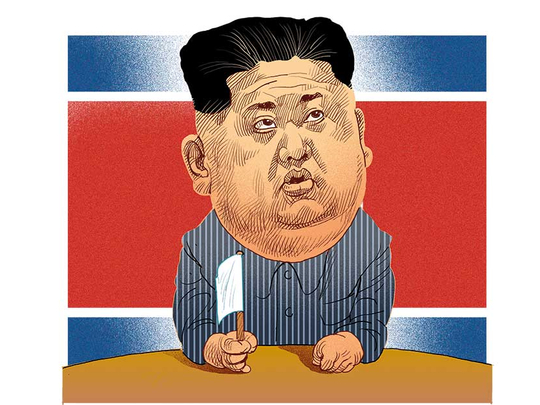
Announcement by North Korean leader Kim Jong-un that his country will stop testing nuclear weapons and intercontinental ballistic missiles is a sign that Kim is ready to do a deal with United States President Donald Trump — and that he understands how a deal with Trump can be made. It’s a delicate dance that Russian President Vladimir Putin and the leaders of Iran are no doubt watching closely. If Kim can swing this, the devil himself presumably could.
Even before the US enters an agreement with North Korea, its very willingness to talk signals the primacy of pragmatism over principle. In North Korea’s case, American interests are basic: The elimination of a North Korean nuclear threat to US territory and the mitigation of tension on the Korean peninsula, where the US has an important ally, South Korea. Though the US doesn’t even have diplomatic relations with the North Korean regime and though Kim’s father and his grandfather have proved time and again that they don’t play by Western rules — the US is still willing to talk.
Once ideological motivations are discarded, three conditions made the Trump-Kim talks possible: South Korean President Moon Jae-in’s desire to pursue closer ties with the North; Kim’s ability to assert victory (after all, the US wouldn’t have come to the negotiating table if not for his successful missile tests); and Trump’s ability to claim victory as well (he can say he forced Kim to negotiate by threatening “fire and fury” and then boosting economic sanctions).
Whether these conditions are also sufficient remains to be seen. Kim could overplay his hand by demanding that the US drastically reduce its military presence in South Korea, and Trump could hold out for a full North Korean denuclearisation, (which he appears to believe is on offer instead of a stop to testing), rather than an internationally controlled freeze on its weapons program. The outcome would depend on both negotiators’ continued ability to lay a convincing claim to victory.
What, then, if a similar combination of circumstances could set the US and Russia on a path toward a deal that would end the current iteration of the Cold War?
Such a deal would need to address Ukraine (but not necessarily Syria — more on that later), clear rules of cyber engagement, mutual electoral non-interference and curbs on both anti-missile defences and means of breaking through them. If Trump and Putin began talks on all these issues, Putin would be able to sell this as his win — finally, he’d say, the West has heard his threats of superweapons and realised that it can no longer ignore Russia as a declining regional power. Trump, too, would be able to tout a win after hitting Russia with tougher sanctions than his predecessor and generally standing up to Putin — while also keeping the possibility of a deal open.
And yet, the timing isn’t right. One thing missing is a Ukrainian Moon Jae-in, someone willing to implement the political part of the long-suffering Minsk agreement and reclaim the bits of Ukrainian territory held by Russian proxies on the softest possible terms. Ukrainian President Petro Poroshenko is severely constrained as he consolidates power to set up his re-election in 2019. Ukrainians won’t elect anyone even remotely dovish on Russia in the immediate future: The two countries’ conflict is too fresh, unlike the Korean War. And without a local dove, the US, too, is constrained since not even Trump can afford to be seen aiding Russia’s dismemberment of a neighbouring country. Realistically, what’s also missing is a US Congress open to a deal. There is no political capital to be won by going soft on Russia now.
In a way, Putin is in a worse situation than Kim, though Russian-American relations, even at their lowest point in decades, are still better than US-North Korean ones. The Russian ruler is a hostage to his relative success in Ukraine; he must hold on to keep looking like a winner. Similarly, he cannot give up on backing Syrian President Bashar Al Assad in Syria — thus Foreign Minister Sergei Lavrov’s announcement last Friday that Russia will supply Al Assad with S-300 air defence systems. Putin needs a third party to bridge the distance between him and Trump, but none exists so he has to pretend he doesn’t really want a deal, even though most Russians, including many in the Kremlin, would heave a sigh of relief if it were made.
The US — especially under Trump — isn’t held back from approaching rogue regimes by its values, but it can be held back by alliances: No deal with adversaries is possible unless regional allies are interested in it and comfortable with the outcome.
— Bloomberg
Leonid Bershidsky is a Bloomberg View columnist. He was the founding editor of the business daily Vedomosti and founded the opinion website Slon.ru.








